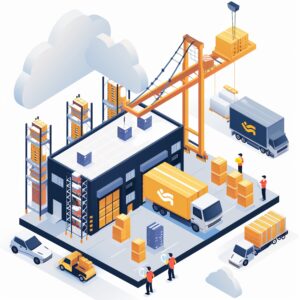Scaling Business Automation with RPA in SAP BTP
In today’s fast-paced business world, the demand for agility, efficiency, and accuracy is higher than ever. Companies are constantly seeking ways to optimize their operations and deliver value faster. One technology at the forefront of this transformation is Robotic Process Automation (RPA), especially when integrated with SAP Business Technology Platform (BTP). By leveraging RPA in SAP BTP, businesses can automate repetitive tasks, streamline processes, and unlock new levels of productivity.
What is Robotic Process Automation (RPA)?
Robotic Process Automation refers to the use of software robots (bots) to automate routine and repetitive tasks traditionally handled by humans. These bots mimic human interactions with digital systems, enabling the automation of data entry, data extraction, report generation, and even decision-making processes. Unlike traditional automation, RPA does not require complex coding and can work across different applications and systems.
SAP Business Technology Platform (BTP) Overview
SAP BTP is an integrated platform that provides a comprehensive suite of tools, services, and solutions for developing and extending SAP applications. It includes capabilities such as data management, analytics, AI, and app development, all designed to help businesses run smarter and faster. BTP serves as the foundation for digital transformation initiatives, enabling companies to innovate rapidly and scale efficiently.
The Synergy of RPA and SAP BTP
Integrating RPA with SAP BTP takes business process automation to a whole new level. Here’s how:
- Automation of Complex Workflows
While SAP BTP provides the framework for managing and optimizing business processes, integrating RPA automates those processes further by taking over tasks that are repetitive and time-consuming. For example, RPA bots can automate invoice processing, purchase order creation, and customer data updates in SAP S/4HANA, eliminating manual intervention and reducing errors. - Seamless Integration with SAP Applications
SAP BTP’s open, modular architecture allows RPA to integrate seamlessly with core SAP systems like S/4HANA, SAP Fiori, and other cloud-based applications. This enables the end-to-end automation of workflows that span multiple applications, enhancing operational efficiency. - Enhanced Data Accuracy and Compliance
Manual processes are prone to human error, leading to discrepancies in critical business data. By automating data entry and validation with RPA, companies can improve the accuracy of their data, which is crucial for maintaining compliance with regulations such as GDPR, tax laws, and industry-specific mandates. - Cost and Time Savings
By reducing the need for manual intervention, RPA helps businesses cut down on labor costs and significantly reduce the time it takes to complete tasks. For example, RPA bots can handle thousands of transactions in minutes, which would otherwise take hours or days for a human workforce.

Use Cases of RPA in SAP BTP
- Accounts Payable Automation
RPA can automate the entire accounts payable process—from invoice receipt and validation to approvals and payments. Bots can extract invoice data, match it with purchase orders, and update the financial systems in SAP S/4HANA, improving cash flow management. - Employee Onboarding
When a new employee joins, multiple systems need to be updated with their information. RPA can automate the onboarding process by filling in forms, generating employee records in SAP SuccessFactors, and setting up access to other SAP applications, ensuring a smooth and error-free process. - Supply Chain Optimization
In industries with complex supply chains, RPA can help manage vendor contracts, process purchase orders, and track shipments. For instance, when integrated with SAP Integrated Business Planning (IBP), RPA can monitor inventory levels and trigger automated reordering processes. - Customer Service Automation
Bots can enhance customer service by automating responses to common queries, processing service requests, and updating customer data in SAP Customer Experience (CX). This results in faster resolution times and improved customer satisfaction.
Key Benefits of RPA in SAP BTP
- Scalability
As businesses grow, so do their operational demands. With RPA integrated into SAP BTP, companies can scale their automation efforts without adding more resources. Bots can handle increasing volumes of transactions, enabling businesses to expand efficiently. - Flexibility
RPA in SAP BTP is highly adaptable, allowing businesses to automate processes across different departments, from finance and HR to supply chain and customer service. This flexibility ensures that automation efforts align with the unique needs of each business unit. - Faster Decision-Making
RPA not only automates tasks but also gathers data from multiple sources to provide real-time insights. When combined with SAP BTP’s analytics capabilities, businesses can make faster, more informed decisions based on accurate and up-to-date information. - Improved Employee Productivity
By freeing employees from mundane tasks, RPA allows them to focus on higher-value activities such as strategy, innovation, and customer engagement. This leads to higher job satisfaction and overall productivity.
Conclusion: Building the Future with RPA and SAP BTP
Robotic Process Automation, when integrated with SAP Business Technology Platform, is a game-changer for businesses looking to enhance efficiency and drive innovation. It not only reduces operational costs but also empowers companies to stay agile and competitive in a rapidly evolving marketplace.
As more companies adopt digital transformation strategies, the synergy of RPA in SAP BTP will play a critical role in shaping the future of business automation. By embracing these technologies, organizations can automate at scale, streamline operations, and pave the way for continuous growth. Read More.


 RECOGNISED WORLD OVER SOLUTIONS
RECOGNISED WORLD OVER SOLUTIONS
 Find out how BSC GLOBAL digitally transformed P2P cycle for worlds renowned brand in Automobile
Find out how BSC GLOBAL digitally transformed P2P cycle for worlds renowned brand in Automobile










